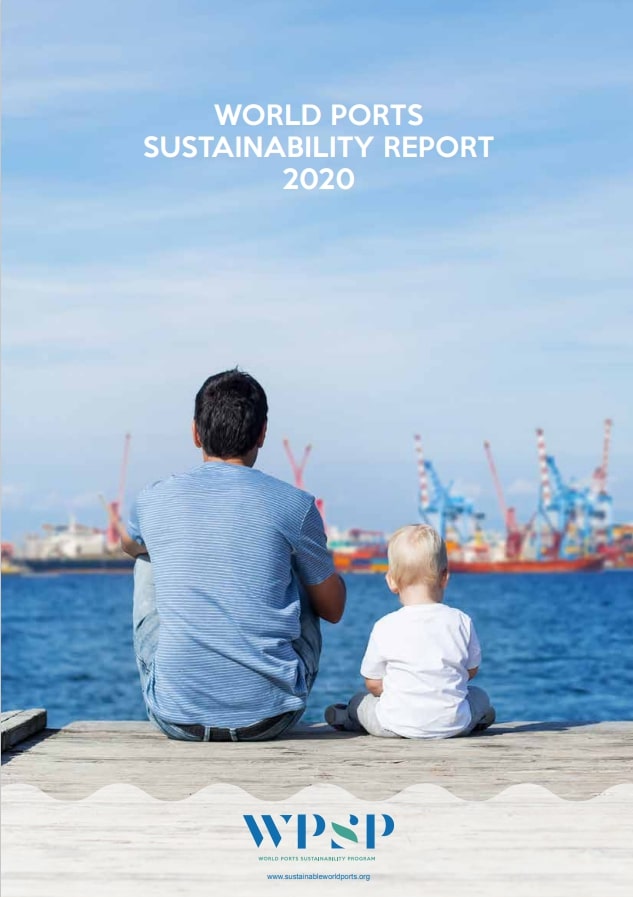World Ports Sustainability Program has published its first Sustainability Report 2020
Recent efforts by PortEconomics members to enhance and coordinate sustainability efforts of ports worldwide, fostering international cooperation with partners in the supply chain are present at in World Ports Sustainability Report 2020 – which has been released in the context of the World Ports Sustainability Program (WPSP) led by the International Association of Ports and Harbors (IAPH).
Guided by the 17 UN Sustainable Development Goals, the report provides how ports are investing in resilient infrastructure, climate and energy, community outreach and port-city dialogue, safety and security and governance and ethics and details global sustainability activities in ports.
The inclusion of PortEconomics members’ activities in this reporting highlights the importance of scientific assistance in fostering sustainability efforts of ports worldwide – as well as the key role of the renowned PortEconomics members in facilitating these efforts.
Sustainability reporting by seaport authorities
In 2019, the Vrije Universiteit Brussel (VUB) launched a survey to investigate sustainability reporting practices of world ports. IAPH endorsed the survey and facilitated dissemination and data collection. The survey gained insights about ports’ rationale behind sustainability reporting and identified the main benefits and barriers. The ultimate aim, in line with the WPSP commitment to transparency, is to promote further sustainability reporting in the port sector.

Some of the key outcomes of the survey are presented in this section – while, IAPH and the VUB research team Magali Geerts and PortEconomics member Michaël Dooms consider further ways of disseminating the full outcomes, including recommendations for sustainability reporting in ports.
The survey gathered a total of 97 responses from ports around the world, with European ports dominating the sample. The findings indicate that more than one-third of the ports report separately and regularly on sustainability following a structured approach. One out of four ports integrates information on sustainability in its annual report while one out of ten ports only reports on an ad-hoc basis. It is interesting to note however, that one-quarter of the responding ports do not actually report on sustainability at all.
The Global Reporting Initiative (GRI) is the cross-sectoral global standard for sustainability reporting. There is a debate however on whether the overall GRI approach can be fully applied to the port sector or whether sectoral guidance for ports is needed. The respondents to the survey appear to strengthen the latter view with only one out of ten ports suggesting that the GRI indicators are sufficient for the port sector.
When it comes to reported barriers for sustainability reporting, the lack of resources is identified as the main issue. This highlights the point that sustainability report-ing requires resources in terms of time, personnel, data collection, analysis, and financing. Data availability, the challenge to select meaningful indicators, and limited engagement from some port users are the other identified significant barriers.
The survey also offers insight in terms of ports’ preferences for environmental management standards and certification. More than half of the respondent ports are certified under the cross-sectoral ISO 14001 environmental management standard. The port sector specific EcoPorts Port Environmental Review System is chosen by one out of five ports. However, one-third of respondent ports do not opt for environmental management certification.
Port Governance
A global survey on port governance was launched at the end of 2019, with the ambition to analyze current structures and functions of port governance around the globe and to lay the foundations for discussions of future port governance models. The study has been developed by PortEconomic members Thanos Pallis and Gordon Wilmsmeier along with a research team at the Universidad de Los Andes, Colombia and University of the Aegean, Greece, and is endorsed by IAPH.

Following a consultation process with various ports and experts around the world, the researchers detailed the different tasks of port governance and divided them into different categories: port policy responsibilities, regulatory responsibilities, technical management of the port area, market and port regulation, management of concession agreements, and management of trends in the maritime and port sector.
Port professionals, port users, and stakeholders are invited to express their understanding on the present state of port governance (i.e. which institution, and/or public or private entity currently performs each task), and their preferences as to who should assume responsibility for each of these functions in an optimal scenario. Respondents are also asked to identify the major scope that ports should serve.
The preliminary outcomes have resulted from a total of 346 responses from port and port related professionals, with 28% Global Port Governance survey. From these respondents, facilitating trade and business is viewed as the main goal for the port system, with the maximization of the added value to the national economy being the second most significant goal.
Contributors have indicated that there are different approaches in existing port governance formats in different countries. Port authorities may only have a secondary role in port policy formation activities, such as in the representation in an international context, where the central government maintains a key role.
In terms of desired port governance formats such as concessions, survey participants point towards the importance of additional entities such as specialized regulatory authorities to maintain responsibilities and assist the optimal function of modern ports.
Thanos Pallis and Gordon Wilmsmeier are expected to report the full findings of the survey during the Annual Conference of the International Association of Maritime Economists (IAME), organized on-line due to the special conditions and restrictions imposed by the COVID19 pandemic.
